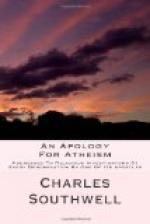Dr. Young held in horror the Materialist’s ‘universe of dust.’ But there is nothing either bad or contemptible in dust—man is dust—all will be dust. A dusty universe, however shocked the poetic Doctor, whose writings analogise with—
Rich
windows that exclude the light,
And
passages that lead to nothing.
A universe of nothing was more to his taste than a universe of dust, and he accordingly amused himself with the ‘spiritual’ work of imagining one, and called its builder ‘God.’
The somewhat ungentle ‘Shepherd’ cordially sympathises with Dr. Young in his detestation of ‘the Materialist’s universe’ of dust, and is sorely puzzled to know how mere dust contrives to move without the assistance of ‘an immaterial power between the particles;’ as if he supposed anything could be between everything—or nothing be able to move something. Verily this gentleman is as clever a hand at ’darkening counsel by words without knowledge’ as the cleverest of those he rates so soundly.
We observe that motion is caused by body, and apart from body no one can conceive the idea of motion. Local motion may, but general motion cannot be accounted for. The Shepherd contends there is nothing more mysterious than motion. There he is right; and had he said nothing is less mysterious than motion he would have been equally so.
For telling these unpalatable truths the Atheist is bitterly detested. ‘The Shepherd’ is a most unorthodox kind of Pantheist; yet even he does not scruple to swell the senseless cry against ‘Godless infidels,’ whom he calls an almost infinite variety of bad names, and among other shocking crimes accuses them of propounding a ‘dead philosophy.’ Yet the difference between his Pantheism and our Atheism is only perceptible to the microscopic eye of super-sublimated spiritualism. The subjoined is offered to the reader’s notice as a sample of Pantheism so closely resembling Atheism, that, like the two Sosias in the play, to distinguish them is difficult:




